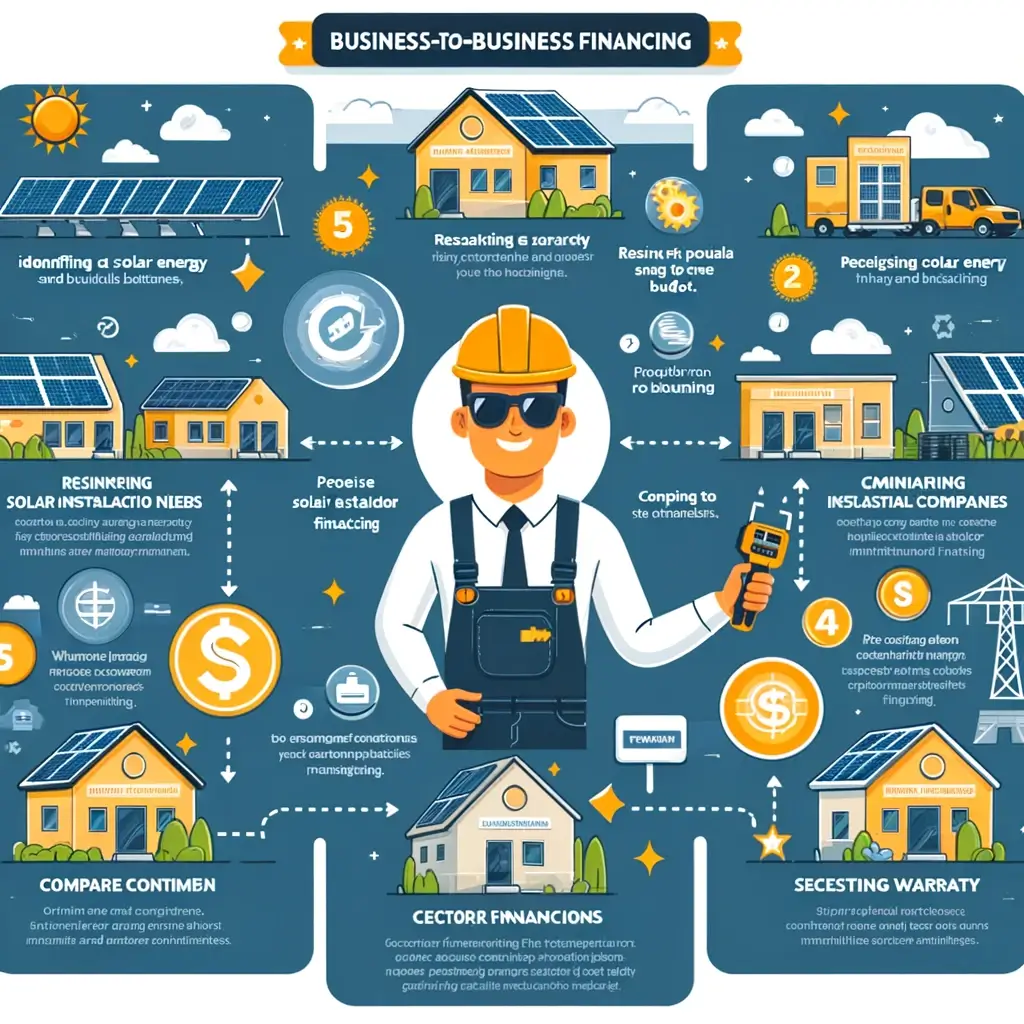When transitioning your business to solar energy, selecting the right solar installer is a critical decision that can impact your solar power system’s efficiency and effectiveness and your business’s financial health and sustainability. The process involves more than just comparing costs; it requires a comprehensive evaluation of the installer’s expertise, financial solutions, and support services. Here, we outline a strategic approach to choosing a solar installer for your business-to-business (B2B) financing needs.
Understand Your Solar Financing Options
Before diving into the selection process, it’s essential to understand the solar financing options available for businesses. These can range from direct purchases, solar loans, and leases to power purchase agreements (PPAs). Each option has advantages and implications for cash flow, tax incentives, and ownership.

Solar Financing Options Table
| Financing Option | Description | Pros | Cons |
|---|---|---|---|
| Direct Purchase | Buy the system outright. | Maximizes tax benefits and savings. | Requires significant upfront capital. |
| Solar Loan | Borrow money to purchase the system. | Retain tax credits and incentives. | Interest can add to the total cost. |
| Lease | Rent the system from a provider. | No upfront costs; fixed payments. | Limited tax benefits; no ownership. |
| Power Purchase Agreement (PPA) | Agree to purchase power at a set price. | No upfront costs; immediate savings. | Long-term commitment; higher cost over time. |
Criteria for Choosing a Solar Installer
1. Experience and Expertise
Select an installer with a strong track record in the B2B sector. Look for companies with extensive experience installing solar systems for businesses similar in size and industry to yours.
2. Financial Stability
Choose a financially stable company capable of supporting your project from start to finish. This is crucial for long-term projects or financing solutions like PPAs.
3. Customized Financing Solutions
Find an installer that offers flexible financing options tailored to your business’s needs. This includes the ability to choose between loans, leases, and PPAs and guidance on maximizing tax benefits and incentives.
4. Comprehensive Service and Support
Opt for an installer that provides end-to-end services, from initial assessment and financing to installation and maintenance. Post-installation support is critical for addressing any issues and ensuring system efficiency.
5. Licenses and Certifications
Ensure the installer has all necessary licenses and certifications. This guarantees their credibility and ensures they are up-to-date with the latest solar technologies and regulations.
Comparison Table for Solar Installers
To help you evaluate potential solar installers, consider creating a comparison table based on the abovementioned criteria. Here’s an example:
| Criteria | Installer A | Installer B | Installer C |
|---|---|---|---|
| Experience & Expertise | 10 years, specializing in manufacturing | 5 years, broad B2B focus | 8 years, focused on retail |
| Financial Stability | High | Moderate | High |
| Financing Solutions | Loans, Leases, PPAs | Direct Purchase, Loans | Direct Purchase, PPAs |
| Service & Support | Comprehensive | Basic Installation | Comprehensive |
| Licenses & Certifications | Fully Licensed & Certified | Certified, some licenses pending | Fully Licensed & Certified |
Conclusion
Choosing the right solar installer for your B2B financing needs is a critical decision that requires careful consideration of several factors. By evaluating potential installers based on their experience, financial stability, financing solutions, and overall service and support, you can ensure that your transition to solar energy is smooth, efficient and financially advantageous for your business. Remember, the goal is to find a partner that meets your current needs and can grow with your business over time.
FAQs:
1. How do I choose a solar panel installer?
Choosing a solar panel installer involves several vital steps to ensure you select a reputable and experienced company:
- Research and Reviews: Research local solar installers and read customer reviews on platforms like Google, Yelp, and solar-specific review sites. Look for consistently positive feedback regarding their professionalism, installation quality, and customer service.
- Experience and Expertise: Consider the experience and expertise of the installer. Check how long they have been in business and their track record with installations similar to what you envision for your property.
- Certifications and Licenses: Ensure the installer has the necessary certifications and licenses. In many regions, reputable installers are certified by national or international solar organizations, which is a testament to their skills and knowledge.
- Insurance and Warranties: Verify that the installer carries the proper insurance to protect your property during installation. Also, inquire about the warranties offered on their workmanship and the solar products they install.
- Quotations and Financial Options: Get detailed quotations from multiple installers to compare prices and evaluate their financing options. Look for transparency in pricing and a clear explanation of the potential savings and return on investment.
- Post-Installation Support: Check their policy on post-installation support and maintenance services. A good installer will offer ongoing support and be responsive to any issues after installation.
2. How do I set up a solar company?
Setting up a solar company requires careful planning and adherence to several key steps:
- Market Research: Conduct thorough market research to understand the solar industry’s landscape, identify your target market, and analyze your competitors.
- Business Plan: Develop a detailed business plan outlining your business model, services offered, marketing strategy, financial projections, and growth plans.
- Legal Requirements: Register your business, obtain the necessary licenses and permits, and ensure compliance with local, state, and federal regulations related to solar installations.
- Certifications: Acquire professional certifications to enhance credibility and expertise for you and your staff. Certifications vary by country and region but are crucial in establishing customer trust.
- Suppliers and Equipment: Establish relationships with reputable suppliers of solar panels, inverters, and other necessary equipment. Consider the balance between quality and cost to provide competitive pricing to your customers.
- Insurance: Secure adequate insurance to protect your business and customers, including liability insurance and worker’s compensation.
- Marketing and Sales: Develop a marketing and sales strategy to attract customers. This can include a professional website, social media presence, and networking within the industry.
- Training and Staffing: Hire qualified staff and provide them with ongoing training in solar technology, installation techniques, and safety protocols.
3. What qualifications are needed to install solar panels in the UK?
In the UK, individuals installing solar panels typically need the following qualifications:
- Electrical Qualifications: A background in electrical engineering or being a qualified electrician is often required due to the electrical components involved in solar installations.
- Solar-Specific Training: Completing a course in solar panel installation that covers photovoltaic (PV) systems is crucial. Courses accredited by the City & Guilds or the Building Research Establishment (BRE) are highly regarded.
- MCS Certification: Installers must be certified by the Microgeneration Certification Scheme (MCS) to ensure installations meet the required standards and customers can access government incentives.
- Health and Safety Training: Knowledge of health and safety practices, including working at heights, is essential for installers.
4. What is the role of a solar PV engineer?
A Solar Photovoltaic (PV) Engineer is responsible for designing, planning, and implementing solar PV systems. Their role includes:
- System Design: Designing PV systems based on customer needs and site evaluations, including selecting appropriate components and calculating system capacity.
- Site Assessment: Conducting site assessments to determine the most efficient and cost-effective solar installations.
- Technical Support: Technical support during solar PV system installation, maintenance, and troubleshooting.
- Project Management: Overseeing project execution to ensure compliance with design specifications, budgets, and timelines.
- Research and Development: Staying updated with the latest solar technologies and methodologies to improve system efficiency and reduce costs.
5. How do you install a solar system step by step?
Installing a solar system involves several detailed steps, including:
- Site Evaluation: Assess the site for solar potential, including roof condition, orientation, and shading issues.
- Design and Planning: Design the solar system based on the site evaluation and energy needs, selecting appropriate components such as panels, inverters, and mounting systems.
- Permits and Paperwork: Obtain necessary permits and approvals from local authorities and utility companies.
- Installation of Mounting System: Install the mounting system that will support the solar panels, ensuring it is securely attached and properly aligned.
- Panel Installation: Attach solar panels to the mounting system, ensuring they are securely fastened and connected correctly.
- Wiring and Inverter Installation: Connect the solar panels to the inverter, which converts DC electricity generated by the panels into AC electricity usable by the home or grid.
- Connection to the Power Grid: Connect the system to the power grid, following local regulations and requirements.
- Testing and Commissioning: Test the system to ensure it operates correctly and safely, and commission the system for operation.
- Final Inspection and Approval: Have the system inspected by the relevant authorities to ensure compliance with all regulations and standards.
- Monitoring and Maintenance: Set up monitoring systems to track performance and schedule regular maintenance checks to ensure the system operates efficiently over time.





